- Home
- Trevor Hoyle
Mirrorman Page 42
Mirrorman Read online
Page 42
OK, forget it. There are other entertainments on offer. He takes a shower, douses himself in Old Spice, slips into his black silk robe. He’s lying there on the bed, rampant as a stallion, ready to fuck anything in lace pants with an ass and two legs, and what happens? Nothing. The door doesn’t open and no Sue Ellen comes in. Maybe, Kersh thinks, he’s growing tired of her. Getting jaded with the same old routine with the same old broad. So he lies there, trying to conjure up a real firecracker who’ll turn him on and light his candle.
He lies there, blank-eyed, waiting, not really aware of the motionless, unchanging stars through the glass ceiling. And after a while he starts to get desperate. He ransacks his brain for a desirable image, and what should pop up but May-Beth, the religious freak who paid him a visit in the Angola State Pen. No, no, Kersh protests, I can do better than that. He doesn’t want May-Beth, for chrissakes: he wants a gorgeous fantasy made flesh. A TV or movie star to drift through the door in a pink negligee, pouting red lips and a please-take-me-but-be-gentle look in her eyes.
Kersh anxiously watches the door, dry-mouthed. If it opens and May-Beth walks in he’ll go apeshit. What are they trying to do: palm him off with third best? He shuts his eyes, squeezing out any thought or image of her, arms spread-eagled on the bed, fists clenched tight. He’s scared now because, if she does appear, and he doesn’t want her to, that means he’s losing control of his own desires. It means that all the cruddy stuff buried deep down there can float up anytime it wants to.
You call the shots around here, Kersh tells himself. You create the universe in your own image – the world you want to exist in.
It works. May-Beth doesn’t show, which proves he’s still in charge and gives him a boost. He’s confident again. The corkscrew in place of his spine starts to unwind, and so does Kersh. The stars above grow dim as he floats off on a cloud, feeling warm and peaceful, breathing in the bracing tang of Old Spice …
Upon waking, Kersh experiences the most horrible feeling he’s ever had in his entire life. There’s somebody inside his mind.
As he lies on the black silk sheets, the unchanging spread of stars overhead, a sense of dreadful panic overwhelms him. Somehow or other, Cawdor has gained access to the tower. He’s down there right now, many floors below, ransacking his store of memories. How can this be, Kersh wonders, when Baby Sam promised to protect him? No way Cawdor can get through: it’s impossible – that’s what he was told. But the impossible is happening. It feels like a termite in his brain. A parasite. Right now it’s a minor irritant, wriggling away, but pretty soon it will burrow its way into the core of his brain and then … and then …
Kersh is sweating. He swings his legs down and stands up, his toes deep in the shaggy pile of the carpet. He is very frightened and also very angry. He feels betrayed. Promises were given, assurances made. He was supposed to be safe here in his tower – nothing could ever get to him. And, if something or someone did get through, there was always Baby Sam. So where is the sleazebag now, Kersh snarls to himself, when he needs him?
He pads through into the living room. The sunken well of white carpet is splashed here and there with pools of lamplight. Over in the comer the glinting bottles on the mirror shelves wink at him invitingly. He could drown his sorrows, but that wouldn’t solve jackshit. It would screw up his head, throw his thoughts into chaos.
Kersh pauses, stares at the bottles.
Maybe that’s exactly what he ought to do. Get smashed out of his skull. How would Cawdor handle being trapped inside the mind of a drunk? But Kersh has doubts. Suppose Cawdor gets to him when he’s muzzy and incapable? He’d be easy meat. Shish kebab on a skewer.
But then another thought strikes him. This is total bullshit! Cawdor is living in his, Kersh’s, world. Cawdor can’t do a damn thing Kersh doesn’t want him to do. I could squish him like an ant if I wanted to, Kersh thinks. He exists in a world I created, a world where the Messengers can spread their Message all over the globe. I control the whole thing. For the first time in his life, Frank Rudolph Kersh is calling the shots. Yes! Then what the fuck, Kersh thinks savagely, is Cawdor doing in his tower? How the hell did he get through? Cawdor is supposed to be out there, in the world Kersh created, dead or dying after six shots were pumped into him and he was dumped in the freezing hold of a 747 over the Atlantic.
But he isn’t.
Kersh’s balls shrivel and contract inside their turkeygizzard sac.
It doesn’t matter how Cawdor got through, he realises, it’s all down to him. If he doesn’t stop Cawdor, nobody will. Jee-zuzz. As usual it’s all down to good ole boy Frank to haul his chestnuts out of the fire.
‘Need some help?’
Kersh notices a brown trail on the white carpet. He follows it to the pulsating bag of pus grinning up at him, feelers twitching, squatting in a spreading pool of green-grey emission.
Kersh retches. The smell alone turns his stomach inside out.
He wipes the spittle from his mouth. Took your time, scumbag.’
‘I only come when you need me,’ says Baby Sam. ‘Got a problem, Frank?’
‘Yeah, he’s in here – down there somewhere.’ Kersh points at the floor. ‘I want him stopped. Can you do it?’
‘I can try…’
‘You can try?’ Kersh is both furious and incredulous. ‘You understand what I’m tellin’ you? I don’t know how the bastard did it but he’s in here and I want him stopped, goddamnit!’
Baby Sam uses a slimy feeler to scratch the place where his nose ought to be. That ain’t s’posed to happen. What went wrong?’
‘I don’t fuckin’ know! Does it matter?’ Kersh aims a kick at him but, being barefoot, is careful not to make contact with the quivering glutinous mound. ‘Get down there and do your job. Not just my ass on the line, remember. He gets through, we all of us take the drop, you included.’
THE CITY OF PERPETUAL NIGHT
1
Each day was like drifting through a warm fog. He seemed to have few recent memories, and the memories he did have were painful and unwelcome: white figures in masks holding shiny instruments, the soft thud and hiss of machines. The sickly aftertaste at the back of his throat, coating his tongue with a pasty white grime.
There was the shaded room too – sunlight glancing off Venetian blinds and splintering across the ceiling.
Cawdor didn’t like this memory. He tried to avoid it. He didn’t want to know why. It was too full of pain. If the thorn in the foot hurts, don’t put pressure on it. Use the other foot. Better yet, don’t walk at all.
But, if his memories were vague, his dreams were vividly alive.
Night after night they came to him, more real than his waking life. He was able to reconstruct last night’s dream, for instance, in every specific detail.
He moved out from his room into the corridor, walking, able-bodied, wondering in which direction Doctor Khuman’s office was. It was the state of abandonment and neglect as much as the darkness that confused him: the floor strewn with rubble and broken glass. The smell of mildew and decay. The slimy sheen of damp on the walls.
He turned a corner, arms outstretched, shuffling through the debris like a sleepwalker.
There was a door in front of him, at the end of the corridor. When he touched it his fingers sank into the spongy mass where the covering had rotted away. It was, or had been, a padded door. As the door swings open under the pressure of his hand a breeze of dank clammy air wraps itself around his face. He hears the swish and gurgle of water, and suddenly he is standing in a scummy frothing tide which laps over his boots and swirls about his calves. The floor tilts. Timbers creak and groan. Everything shudders as the sea batters at the wooden walls. Somewhere from the darkness comes a scuffling and squeaking, and Cawdor becomes aware of yellow slitted eyes on all sides watching with a steady, unblinking malevolence. Their human larder has arrived.
But he is mistaken.
It isn’t him the rats are watching.
A man is slumped on a
heap of gravel, knees drawn up under his chin, iron manacles round his wrists and ankles. His eyes are shut. He might be sleeping, Cawdor thinks, but if so it is a fitful, unsettled sleep. The man’s shoulders twitch and jerk. Spasms chase themselves across his face as dark murky dreams swim up to the surface. Now and then he starts violently and his eyelids spring open, only to droop again, the head lolling forward, the tics resuming their game of hide and seek across his ravaged features, grey with fatigue.
Cawdor watches the man’s troubled sleep for some time. It is like observing a racial memory. A dream of his own come to life. He is both watcher and watched.
This is the mirror world his dreams have led him into, Cawdor realises, the world he now inhabits. Now he doesn’t need to awake; he can continue exploring the mirror world until, at last, it brings him face to face with Kersh. He is relentless and filled with fierce resolve. Nothing will stop him. There is no escape for Kersh – nowhere for him to hide from the consuming desire for revenge that fuels Cawdor like a hard bright flame.
He moves on, confidently. Ahead of him in the gloom there is a staircase, heaps of dust in the corners. As he climbs it he sees that the varnish on the banister rail is worn through to the wood with the passage of many hands. The staircase leads up to a corridor, the walls dim and green under the ceiling globes. Cawdor lifts his head. He can smell something burning, sharp and acrid. Through a half-open door he glimpses a figure lying on the bed, shrouded in white. Wires trail across the floor. The smell of burning is stronger now, and he can hear the dry crackle of electricity.
All this is familar to him. It is too familiar. The same dream as before.
Cawdor moves to the bed. This time he is afraid to look because he knows what he will find. Even though he tells himself it won’t be the same, he knows that it will. And it is.
He pulls back the sheet and looks at himself, the rubber pads clamped to his temples, his own face creased with pain as the surges of electricity course through his body. He stands holding the sheet in his hand, feeling the sickness of despair as he gazes down at the white, foam-flecked face.
And as before, as he knows they will, the dulled, unfocused eyes seek him out, and the mouth twists into a tortured grin.
Took your time, Jeff…’ The words escape with agonising slowness. ‘But you finally made it.’
The image vaporises and fades away to nothing. Cawdor looks at his hand, the fingers curled, still holding the nonexistent sheet – just as it was the last time.
I’ve been through all this, Cawdor thinks, and it’s happening again. I’m not climbing the tower at all. I’m no nearer to Kersh than I was before. I’m going round in circles.
Cawdor cups his hand to the window and stares out. The scene is unchanging. Buildings loom on all sides, rising up to a starry sky. The pale slice of moon hasn’t moved. Nothing here ever moves or changes; it just repeats itself endlessly. He feels numb with despair and defeat. How can he break free of this? More than belief in himself, Cawdor realises, he needs help from outside. Somehow he has to reach out to Doctor Khuman and Gil Gribble, get a message to them. Do they know he’s trapped in here? How can he communicate with them?
How?
Cawdor squeezes his left hand, trying to stop the pins and needles shooting through it. The tingling is driving him insane.
He shuts his eyes and sees the hand, ghostlike, floating in midair. Of course – there is a way. The way he got through before, to Gribble and Annie Lorentz, when he was in the coma at Mount Sinai Hospital. They interpreted the message and had him moved to the Troth Foundation. That must mean, Cawdor thinks, hope rising again, he can communicate with the outside world. Kersh has his allies out there in the Messengers and Mara BeCalla; and so has he – if only he can reach them.
Eyes closed, he pulls together every shred of concentration, willing Doctor Khuman and Gribble to hear him and understand. Please hear me and understand how much I need your help. Raising his hand, he presses it flat to the window and feels a million tiny pins jabbing away in his fingertips. Some form of interaction – an exchange of energy – between his hand and the glass. The tingling increases and shoots up his arm like an electric shock.
What does it signify – that his message has got through? That out there they can hear him, and understand, and help him?
Cawdor opens his eyes and stares through his own dim reflection at the city spread out before him. He waits in the timeless moment for a sign, something to tell him he is not alone. He waits, and nothing happens, and continues to happen. But then, miraculously, he sees a light. No – a cluster of lights – in the distance. Night wind blowing sand across the blacktop. A car pulls in at a gas station. A man with lank fair hair takes a gun from the glove compartment and tucks it inside his dark-blue windbreaker as a red-haired kid pumps gas into the tank. The man gets out, stretches, and ambles towards a wooden shack…
The same thing, exactly as before. The same events happen and keep on happening. And he can do nothing. It isn’t Kersh who’s trapped in here: it’s him. It will take an eternity to climb the tower, and even then, at the end of it, he will be no nearer. The knowledge is like a tremendous deadening weight on his spirit.
The circle is unbroken, Cawdor knows, interminably going round and round towards never ending infinity.
From his window Gil Gribble looked at the moon hanging in the summer sky, bright and sharp as a silver dollar, with just one or two faint stars becoming visible as the colour drained away and the darkness deepened over the wooded slopes.
Doctor Khuman’s housekeeper, Mrs Brandt, had shown him to the room earlier that evening, and in passing had remarked that it was the one Cawdor had occupied on his first visit. Gribble wished she hadn’t told him that. He was miserable enough, and the poignancy of his spending the night in the same room made him even more despondent. He was also feeling guilty. Jeff’s condition hadn’t improved; in fact he had relapsed into a coma. They should never have transferred him from Mount Sinai Hospital in New York. There he would have received expert medical attention and the best possible nursing care. Moving him here was too great a risk – greater, certainly, Gribble reckoned, than the supposed threat to his life had he remained there. After all, they could have tightened up on security, hired 24-hour protection if needs be. It was a mistake, and he regretted it bitterly.
Gribble turned away from the window and switched on the bedside lamp. He thought he might read for a while. He was fairly tired, but too restless to sleep. He sat down on the bed and then immediately got up again. Maybe a walk in the grounds would settle his nerves. He went to the door, stood dithering there for a few moments, and instead turned about and headed for the bathroom. He wasn’t sure why, because he didn’t need to pee, but Gribble turned the handle anyway and went in.
His own dim reflection, silhouetted against the glow of the bedside lamp, confronted him in the bevelled mirror of the vanity cabinet. The sight of his round face and tangle of reddish beard depressed him even more. The idea of him and Annie Lorentz becoming an item – what a joke. Where did he get these crazy notions? You only had to look at him to know it was plain ridiculous. What kind of juvenile fantasy land was he living in to even contemplate such a –
Gribble’s mind stopped dead. He felt the breath gather in his chest, and involuntarily he held it in as if a sudden shock had seized up both his lungs. Which it had. The bathroom was in semidarkness, the only light from the lamp in the bedroom, and by its glow he saw a row of letters appear on the surface of the mirror.
R R T S E
A second row formed itself:
E E S D N
And was followed by:
W T A E A
O N E E H
T E B N T
It hardly took a moment to interpret the mirror writing, because Gribble knew already what it meant: THANE NEEDS BEAST ENTER TOWER.
As he read the message in the mirror, it seemed to Gribble as though his mind was a flower opening to the sun. The same message, of cours
e, that Cawdor had sent via the computer – but only part of it. Gribble nodded to himself, knowing why, because now he understood. This was the vital part. Trapped in its shell of a body, Cawdor’s mind was reaching out to him, striving to communicate this final desperate instruction, or plea, or cry for help.
Gribble wasn’t sure which. But that didn’t matter.
* * *
Leaning back in his seat, the driver said over his shoulder, ‘Albany coming up, sir. Should I stay on 87 or branch west on interstate 90?’
‘Take the shortest route.’
‘Not sure which it is,’ the driver said. He glanced across the darkened cab of the recreational vehicle to his companion, who was peering at a road map spread over his knees with the aid of an angled spotlight. ‘What say?’
‘Not much to choose between ’em.’
The driver glanced back again, anxious not to make a mistake.
‘Use your best judgement,’ Graye said.
The driver’s companion came to a decision. ‘OK. Take interstate 90. Then we head north on route 30 past Great Sacandaga Lake.’
‘And the distance from here?’ Graye asked.
‘Less than a hundred,’ the man with the map said. ‘Probably nearer eighty.’
Graye leant back in the padded chair, his hands splayed loosely over the armrests. His face was hidden in shadow except when a neon sign along the highway or the headlights of a car splashed briefly across it. Even then his expression was hidden in the deep pits of his bony eye sockets.
Behind him sat the other elders. In the chair next to his, Phyllis Keets stared straight ahead, her round face framed by tiny kiss curls, her lips pressed tightly together. The slight jolting of the ribbed tyres on the concrete highway made her bosom jerk and tremble, causing the silver pin on her left breast to send out faint flashing gleams.
Ahead, a cluster of signs announced they were nearing the divergence of the two interstates: to the north, Saratoga Springs and Glens Falls; to the west, Schenectady, Amsterdam and Utica. The driver signalled and slid into the right-hand lane, slowing the vehicle to take the curve through the underpass which led on to interstate 90.

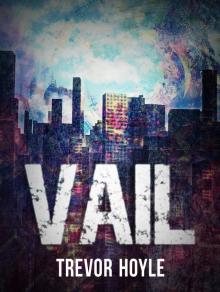 Vail
Vail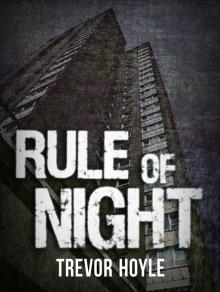 Rule of Night
Rule of Night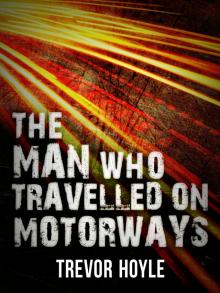 The Man Who Travelled on Motorways
The Man Who Travelled on Motorways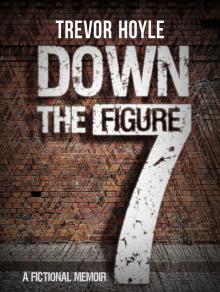 Down the Figure 7
Down the Figure 7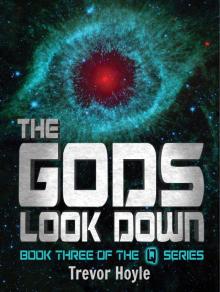 The Gods Look Down
The Gods Look Down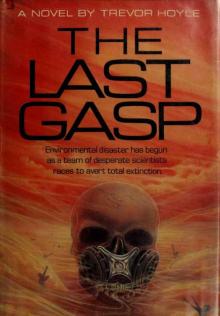 Last Gasp
Last Gasp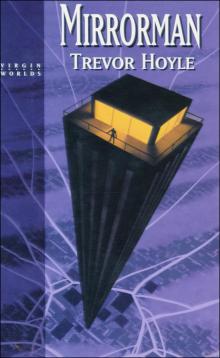 Mirrorman
Mirrorman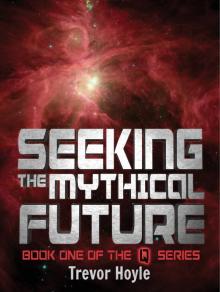 Seeking the Mythical Future
Seeking the Mythical Future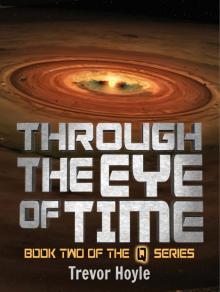 Through the Eye of Time
Through the Eye of Time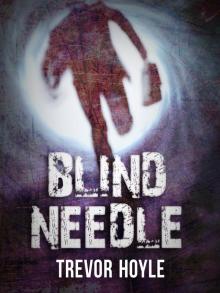 Blind Needle
Blind Needle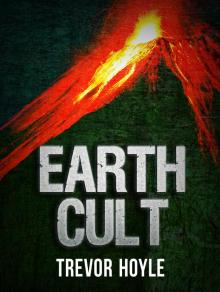 Earth Cult
Earth Cult